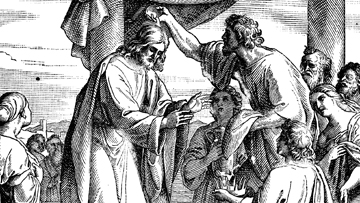The book of Judges accentuates the people’s need for a king. Ruth promises the coming of the king. The books of Samuel record the king’s arrival. First Samuel begins with the birth of the Prophet Samuel (c. 1140 BC), the last of Israel’s judges. In chapter 4, the Philistines capture the ark of God at Shiloh. Then, in chapter 10, Samuel anoints Saul as king at the insistence of the people (c. 1070 BC) and contrary to the warnings of Moses (Deut. 17) and Samuel (1 Sam. 8).
God rejects Saul (1 Sam. 15), and directs Samuel to anoint David as king (c. 1065 BC; 1 Sam. 16). A long struggle ensues as Saul seeks to destroy his rival. David exercises great patience, waiting on God’s time to assume official leadership of the kingdom. In the meantime, Samuel dies (1 Sam. 25) and is mourned by the people (c. 1057 BC). Finally, Saul is wounded in battle against the Philistines and, rather than be found by the enemy, he ends his own life by falling on his sword (c. 1055 BC; 1 Sam. ...
